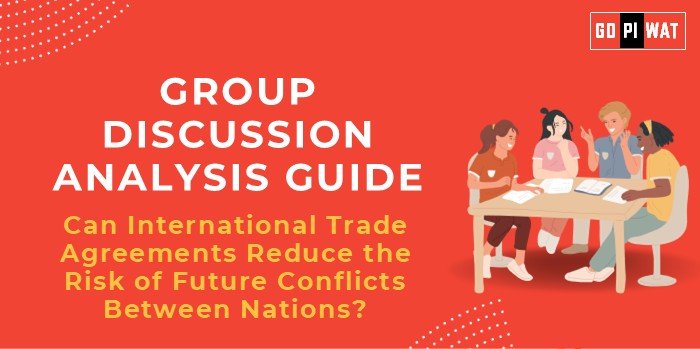📋 Group Discussion (GD) Analysis Guide
🌍 Can International Trade Agreements Reduce the Risk of Future Conflicts Between Nations?
💼 Introduction to the Topic
Opening Context: Trade agreements are foundational in shaping global economic relations and fostering peaceful cooperation. The economic interdependence created by trade is often cited as a deterrent to conflict.
Topic Background: Historically, agreements such as the General Agreement on Tariffs and Trade (GATT) and modern mechanisms like WTO frameworks aim to reduce trade barriers and promote mutual growth. Recent agreements like RCEP and USMCA reflect evolving economic partnerships aimed at stability and shared prosperity.
📊 Quick Facts and Key Statistics
- 💸 Global Trade Value: Over $32 trillion in goods and services traded annually (WTO, 2023), showcasing interconnected economies.
- ⚔️ Conflict and Trade Disruption: $1 trillion annual economic impact due to trade-related conflicts (World Bank, 2022).
- 🌏 RCEP Membership: Involves 30% of the global GDP, showing massive economic collaboration in Asia-Pacific.
- 🌐 WTO Members: 164 nations, highlighting widespread reliance on trade frameworks.
👥 Stakeholders and Their Roles
- 🏛️ National Governments: Negotiate and enforce trade terms while promoting national interests.
- 🌐 International Organizations: WTO and regional trade blocs mediate disputes and set rules.
- 🏢 Private Sector: Drives global trade while ensuring compliance with agreements.
- 👥 Citizens: Benefit from economic growth and stability created by agreements.
🏆 Achievements and Challenges
🌟 Achievements:
- 📈 Economic Growth: USMCA added $68 billion to the North American economy in 2022.
- 🤝 Conflict Mitigation: EU integration reduced inter-European conflicts post-World War II.
- 🚀 Trade Facilitation: African Continental Free Trade Area (AfCFTA) is expected to boost trade by 52% by 2030.
⚠️ Challenges:
- 💥 Trade Wars: U.S.-China tensions cost $350 billion in tariffs (IMF, 2023).
- ❌ Exclusion Issues: Developing nations face limited access to advanced markets.
Global Comparisons:
- ✅ Success: EU shows how economic integration fosters peace.
- ⚡ Challenges: Brexit highlights complexities in sustaining agreements.
Case Studies: ASEAN’s incremental reduction in tariffs has promoted regional peace.
✨ Structured Arguments for Discussion
- 💬 Supporting Stance: “Economic interdependence from trade agreements reduces incentives for conflict.”
- ⚖️ Opposing Stance: “Trade agreements often prioritize economics over geopolitics, failing to address core conflict drivers.”
- 🔄 Balanced Perspective: “While trade agreements reduce tensions, complementary strategies addressing political disputes are crucial.”
🎯 Effective Discussion Approaches
- 📖 Opening Approaches:
- “With trade driving 60% of global GDP, can its integration truly ensure peace?”
- “Trade wars like U.S.-China illustrate that agreements alone cannot prevent disputes.”
- 🔄 Counter-Argument Handling:
- “While economic integration is key, geopolitical disputes often require multilateral dialogue beyond trade frameworks.”
📈 Strategic Analysis of Strengths and Weaknesses
- 💪 Strengths: Promotes economic interdependence, creates dispute resolution mechanisms.
- ⚠️ Weaknesses: Exclusionary practices, dependency on stable global governance.
- 💡 Opportunities: Enhance multilateralism, focus on equitable growth.
- 🚨 Threats: Rising protectionism, geopolitical tensions.
📚 Connecting with B-School Applications
- 🌟 Real-World Applications:
- Trade conflict analysis for finance and strategy projects.
- 💬 Sample Interview Questions:
- “How can trade agreements help stabilize geopolitically sensitive regions?”
- “Discuss trade agreements as tools for economic diplomacy.”
- 📖 Insights for B-School Students:
- Research trade’s role in global supply chains and conflict prevention.


